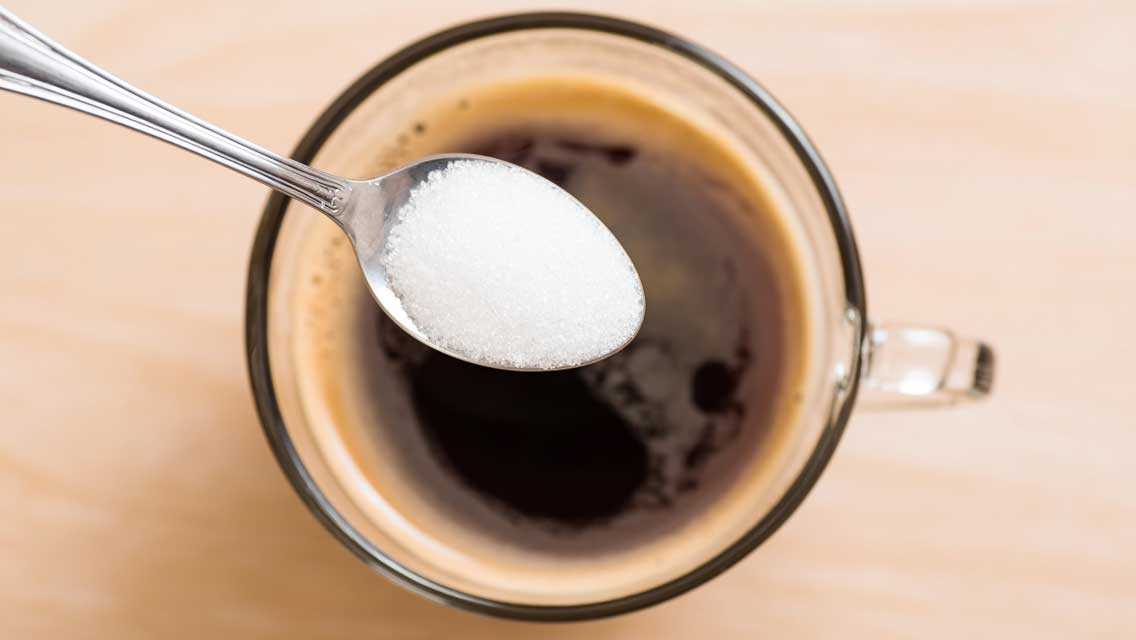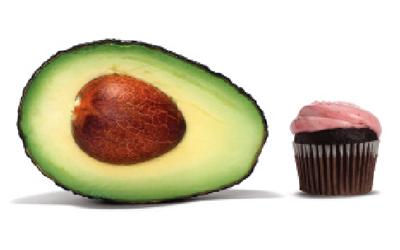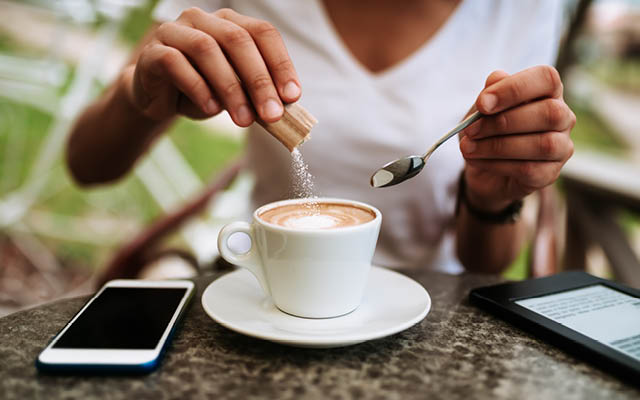Walk into your average corporate office plaza and you’re likely to see a bunch of people who have one hand on their work, the other clutching a mega coffee cup, a bottle of soda or a vending-machine snack. This, it seems, is the preferred method for powering through long days, energy lows and mentally demanding projects.
At times, all of us can use a little boost, and when we do, it’s certainly convenient to reach for some coffee, a soda or a sugary snack. And what’s wrong with having a little morning or afternoon pick-me-up? Nothing, really, as long as it’s a now-and-then thing. But when we come to rely on these energy crutches as a daily means of support, it can mean trouble. And these days, health experts are concerned that many of us are leaning on those crutches a little too hard.
“Americans feel the need to squeeze as much as possible into every waking hour, and they rely on caffeine and sugar to help them do this,” says Herb Joiner-Bey, ND, coauthor of The Clinician’s Handbook of Natural Medicine. “We are stressed out, overworked and overcommitted.” And as a result, he says, many of us are also chronically overstimulated.
Hyped-Up Habits
Americans consume an estimated 500 million cups of coffee a day, with nearly 50 percent of all office workers drinking four or more cups of coffee daily. Based on U.S. Department of Agriculture data, most of us also consume approximately 196 grams of sugar (a 20-ounce bottle of soda contains about 67 grams). There are a few problems with this type of habit:
1. Rather than revving up energy the old-fashioned way (manufacturing it from healthy food and adequate cycles of sleep and recovery) our bodies come to rely on a steady supply of stimulants. Any time we feel our energy dip, we instinctively reach for more, not recognizing (or ignoring) our real need for rest, relaxation and good, solid nutrition. (For more on this cycle, see the “Energy Crisis“.)
2. Drinking a lot of coffee and soda may discourage us from drinking enough pure water, negatively affecting many other areas of health and metabolism. Depending on what we drink and how we doctor it, such habits can also lead us to imbibe more calories or artificial sweeteners than are good for us.
3. Caffeine and sugar pose their own problems for the body. Caffeine can block the absorption of certain nutrients and put a strain on our adrenal glands. Excessive sugar intake has been shown to reduce immunity and increase the risk of insulin resistance, diabetes and obesity.
Unfortunately, most of us don’t even realize we’re too dependent on caffeine and sugar. Those of us who do aren’t often willing to do much about it. These indulgences are so socially sanctioned, and so pleasant to consume, it’s hard to believe they really pose a problem. The good news is that healthy people needn’t abstain from caffeine and sugar entirely. We just need to learn how to use, not abuse, them.
“A little caffeine can help increase your energy for a bike ride and enhance concentration. And sweet treats are some of the great pleasures of life,” says Gretchen Newmark, MA, RD, a nutritionist in Portland, Ore. Both sugar and caffeine do serve their purpose, she notes. “You just want to avoid needing them in order to function.”
How Caffeine and Sugar Impact Your Energy Levels
Ever wonder why you suddenly feel more attentive and energetic after downing an espresso, a cola or candy bar? Caffeine and sugar catalyze different biochemical processes, but both of them result in your body freeing up energy stored in your cellular tissue and electrical systems.
Within about 15 minutes of consuming caffeine, a stimulant, your blood pressure rises slightly and your liver triggers the release of triglycerides (the chemical form of most stored fat) into your blood stream. Many experts believe this results in an energy boost. Caffeine also triggers the release of the neurotransmitter noradrenaline, which enhances activity in the area of the brain that controls wakefulness, alertness and thought processes.
While sugar is not technically a stimulant, its net effects are similar. Sugar, taken in concentrated or refined form, spikes blood-sugar levels, which raises insulin levels and pumps more energy into your system, according to Stanley Segall, PhD, a professor of biochemistry at Drexel University’s department of nutrition and food science. Additionally, sugar can increase levels of other hormones, including serotonin, which influences mood and gives you that feel-good sensation. Sugar also boosts production of two other brain chemicals: dopamine, which triggers feelings of euphoria, as well as aggressiveness and hyperactivity; and norepinephrine, which is similar to dopamine and helps you to feel more focused and motivated.
Sounds like good stuff, right? Well, it can be. If you are healthy and eat well, you can probably enjoy stimulating foods and beverages without much negative effect. But when you make lattes and sugar snacks a staple of your daily diet, you may find that your body’s built-in energy-production systems begin to suffer.
“If it’s chemically overstimulated too regularly, your body learns it does not have to produce these chemicals on its own,” says Ron Hunninghake, MD, of the Center for the Improvement of Human Functioning International, in Wichita, Kan. “It can become dependent enough on your stimulant and sugar habits that you no longer function normally without them.”
The result? It’s like you’ve been living on borrowed energy: If you miss your daily caffeine or sugar hit, you may suddenly start feeling the deficit in a big way. You could end up feeling foggy, exhausted or even depressed. You might endure headaches and have trouble staying focused on the job or during workouts – assuming you can even make it to the gym.
How Caffeine and Sugar Impact Your Body and Mood
Although caffeine affects everyone differently, as little as 100 milligrams (mg) of caffeine (a little less than a single cup of coffee or about two 12-ounce cans of cola) can produce noticeable body and mood changes in some people. A study in the July/Aug. 2002 issue of Psychosomatic Medicine found that the effects of caffeine taken in the morning (250 mg, or about two cups of coffee) could easily last throughout the day and, worse, amplify existing stress levels.
On top of its other hormonal effects on the body, caffeine raises levels of adrenaline, the body’s major stress chemical. So if you get stressed, caffeine can actually fan the flames, causing you to end up feeling more frazzled than usual and making it harder for you to relax.
Over time, supporting a heavy caffeine habit can snowball into bigger health problems. “Since caffeine raises your normal blood pressure, too much can cause heart palpitations and insomnia,” explains Hunninghake. “It can also tax the adrenal glands,” he says, thus inviting adrenal fatigue that could leave you suffering from bouts of severe exhaustion and make you more susceptible to weight gain.
Finally, heavy caffeine consumption has a diuretic effect (meaning it causes you to urinate more). This can lead to the depletion of many vital nutrients, such as calcium, magnesium (both of which have vital and complex interactions with other nutrients) and B vitamins (a group of vitamins particularly important in managing stress).
Sugar has a different, but equally troublesome, effect. While refined sugar does provide a quick boost of energy, the body responds by releasing a burst of insulin to keep blood-sugar levels in check. Consume a lot of sugar, and the increase in insulin can make blood-sugar levels rise and fall dramatically. These sudden spikes in insulin levels inhibit the release of growth hormones (the ones that keep you looking and feeling young and fit) and, in turn, depress the immune system.
The other bummer: Plummeting blood-sugar levels can leave you fatigued, irritable and craving more sweets – the infamous sugar crash. This constant seesaw effect can gradually affect your body’s ability to adjust blood-sugar levels on its own, which can generate conditions like hypoglycemia and type 2 diabetes.
Don’t be surprised if your healthy-eating habits take a hit too. Caffeine and high amounts of sugar can suppress your appetite, making you more likely to skip regular, healthy meals. This forces your body to do without valuable nutrients, further taxing its systems and causing you to rely on more sugar and caffeine to get through the day – a classic vicious cycle.
How to Cut Back on Caffeine and Sugar
OK, by now you may be thinking that you have to shun all coffee and sweets for good. Not necessarily: As long as you can enjoy them in moderation and utilize their benefits without falling into dependency, you’re fine. The trick is not to reach for stimulants every time you need a boost. Instead, make smarter food and drink choices.
For instance, if you crave sugary foods, you’re probably not getting enough of something else, namely protein, says Joiner-Bey. He suggests beginning your day with a high-protein breakfast that can set your blood sugar on an even keel. Then, as the day goes on, choose meals and snacks that combine complex carbohydrates, protein and healthy fats.
Meals like these are digested far more slowly than pure sugar, contain far more nutrients and will keep you energized longer. Good choices include a turkey sandwich on whole-grain bread or a salad topped with grilled salmon or tuna. Some other suggestions for better eating:
- Eat at regular intervals throughout the day and don’t skip any meals. This will keep blood sugar and mood steady and maintain your energy.
- If you find yourself dragging in the afternoon, drink one or two glasses of water. “Most people are terribly dehydrated, and just replenishing fluids can often wake you up,” Newmark says.
- If you crave something sweet, avoid the vending machine and choose a healthier alternative, such as a few raw dates filled with almonds, a small low-fat yogurt or some fresh fruit. They’ll deliver the boost you need, but without the impending crash.
If coffee is your weakness, try to reduce your number of daily cups to three. Gradually reduce this number to two and then weave in a noncaffeinated (or lower-caffeine) beverage for the second cup. Black tea generally has around one-third less caffeine than coffee, says Segall. Or you could opt for green or oolong tea: An 8-ounce cup of oolong has approximately 70 percent less caffeine than a similar serving of coffee, and green has about 90 percent less. This way your body can adjust to less caffeine without enduring withdrawal symptoms.
As long as you are healthy, eating a well-balanced diet and getting enough rest, it’s unlikely that occasional use of caffeine and sugar is going to do you much harm. But, says herbalist Brigitte Mars, author of Addiction-Free Naturally, “If you need stimulants just to keep up with your fast-paced lifestyle, it’s a sign you should take a long look at how you are living your life. Start eating better, getting enough sleep and exercising, and you probably won’t even feel the need for chemical boosts.”
The beauty part: Once you get to that point, caffeine and sugar can return to their original roles – as a few of life’s simple pleasures.
Popping Your Pep
Most over-the-counter pepper-uppers are mostly caffeine, and when used occasionally they won’t necessarily harm you. But if you’re using them regularly, that’s probably a bad sign – that you’re overdriving your engine, not nourishing yourself adequately and not getting enough rest.
Be mindful that caffeine supplements like NoDoz and Vivarin don’t work any better or faster than other caffeine sources, and they carry all the same downsides. A single pill contains about 200 mg of caffeine. But since they are easier to take than drinking a lot of coffee or soda, you might be tempted to use more than what’s recommended.
Also, if you keep them in your desk drawer for long days, you may also wind up relying on them to keep you working long past when you should call it a night. Finally, most experts suggest that you shouldn’t use such products if you are currently taking monoamine oxidase (MAO) inhibitors. To be safe, check with your doctor.
Drinks in Overdrive
Energy drinks make a lot of promises: They’ll increase endurance, improve performance, stimulate metabolism, sharpen the mind. But they also cause concern among health experts who argue that some of their herbal ingredients have not yet been proven safe in combination, and that they can lead to dehydration and other problems if used during exercise or combined with alcohol.
Beverages like Red Bull, Jolt and SoBe Adrenaline Rush all contain significant amounts of sugar (about 5 teaspoons per can) and caffeine (about as much as a cup of coffee), along with slightly different combinations of other ingredients. For example, Red Bull contains a big dose of the amino acid taurine (said to strengthen the heart). SoBe Adrenaline Rush blends taurine with D-ribose (a type of sugar that enhances the body’s ability to restore muscular energy), as well as herbs like guarana (another form of caffeine) and panax ginseng.
How much of their hype holds water? Researchers at the University of Paderborn in Germany examined the effects of Red Bull on 13 athletes who performed bouts of endurance exercise. They found that the drink, when taken prior to exercise, strengthened heart contractions and increased the volume of blood pumped, improving performance over caffeine alone. A recent study in the journal Amino Acids showed that graduate students who drank Red Bull an hour before being tested rated higher in terms of mood and mental sharpness.
But many experts argue that the so-called benefits of these drinks are outweighed by their potential for dangerously dehydrating the body and for causing an insulin-driven blood-sugar crash. Energy drinks like Red Bull have been banned in France and Denmark.
For more on the debate, see www.medicalnewstoday.com/medicalnews.php?newsid=5753.




This Post Has 0 Comments